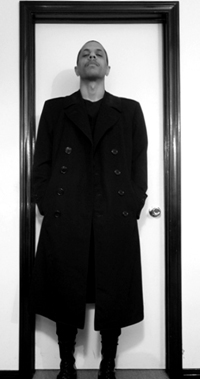This month, we talk to Eric Davis, a BA in the sound department.
By Brandon Goei

On the 12th floor cafe of MacLean, a slender man dressed in black stands in front of the toaster — fluid but not loose, bowed but not hunched. He seems a fixture of his surroundings, so much so that I’m slightly startled when he calls out to me, “Hey, how’s it going?” Never moving from his position, never looking up from the counter. It takes me a second to register his greeting, and I stammer back a throwaway response. That wasn’t the first time I’d spoken to Eric Davis, but it was the first time I’d had a real conversation with him. He was taking a break from class. One of his classmates had produced a work so profound and moving that Eric needed a moment away — this piqued my interest.
A few days later I found myself at his studio, sampling some of his work. There were icons of the analog past strewn about — synthesizers, samplers, sequencers, and a turntable with a sizable stack of vinyl nearby. I had no idea what to expect when he pushed ‘play’ on the CD player, which made for a fantastic surprise when ear-splitting dissonance crammed a series of harmonic inquiries into my head. The second track was what sounded like someone drawing a knife, stabbing a small animal, and sheathing the blade, only to repeat the process for one minute straight. After that was a long hypnotic night drive through the Eastern Bloc. Then, the Pacman Army death march. And then others.
I came back to Eric’s studio the next day and we talked about music and today’s poser culture — we didn’t talk about Lady Gaga.
Brandon Goei: What’s your mindset when you start on a piece? Do you set aside a time, or is it random inspiration?
Eric Davis: I wouldn’t exactly say ‘random’…
BG: Maybe ‘chance’ is a better term?
ED: Well, both of those terms make me think of John Cage and ‘happenings’ and I don’t give those things too much credence in the context of my work, even though they do exist. For me, it starts with an idea or my desire to make something, and I come into the studio and start working. Sometimes I just keep working on beats and saving them — shelving them until I can come back with some sort of inspiration to add to them. I hit all of the different instruments at different times, so I guess it does sort of happen kind of … randomly. In a matter of speaking.
BG: Does your musical taste factor into it at all?
ED: Oh absolutely. Well, no. Yes … Indirectly, I suppose. All of those sounds are floating around in my head and sometimes I feel like I’m butting up against them and I do something different because I’m not terribly concerned about doing something terribly derivative. And then other times I’m playing something that sounds really good, until I realize that it actually sounds like this or that. So all of the music I listen to is continually cycling in my head, and sometimes things that are floating around in my long-term memory occasionally resurface.
BG: Let’s change gears a bit. Complete this sentence: “When I hear Lady Gaga, I _____.”
ED: Actually, I don’t hear Lady Gaga.
BG: You’ve never heard a Lady Gaga song?
ED: Well, I guess I might have at some point, but I couldn’t identify one.
BG: What about pop music in general?
ED: Today’s pop music is something I’m very unfamiliar with. I think the last thing I actually heard in earnest was Madonna’s “Confessions on a Dance Floor,” which takes us back a few years.
BG: So you just don’t follow popular music?
ED: Absolutely not.
BG: Do you have any stance on it either way? A lot of the things coming out these days are more dance-oriented, which I hear in some of your work.
ED: It depends. One doesn’t need to stretch the truth to say that The Cure was a pop band, even prior to “Friday I’m In Love.” The pop music that they made, though, was closer to my personal aesthetic. I’m not waving any banners saying that stuff should be wiped out. There are times, using The Cure as an example, when pop moved in a direction that agreed more with my aesthetic, but there hasn’t been something like that recently.
BG: Are there any contemporary artists whose music you do enjoy?
ED: Sure, there are plenty of people making music these days that are worth listening to.
BG: Care to name a few?
ED: Hmm… [under his breath] I don’t know if I really want to.
BG: How come?
ED: I feel like there’s a certain sacredness to the music that they make. The people that listen to pop and “Pitchfork” bands — I hate to make a generalization, but it’s been my experience that music doesn’t hold a great significance in their lives. And I come from a place, time and mindset in which music is extremely important and serves as a strong tie within individual groups. A foundational facet of identity. It shows the space between people — you had the punks and they listened to punk and they looked like punks, and you had hessians and they listened to heavy metal, etc. There were these really clear distinct boundaries between communities, and there were certain steps to take to make it into one. It always started with some kid who gets told to ‘fuck off and go home’ because he’s not cool enough to hang out with a group. And then he matures a bit and opens his ears and his mind, and can start to really have something to say in that community, so he’s accepted. You had to earn yourself the right to belong to a subculture, which was often musically-based. But those things don’t really exist anymore.
BG: What happened?
ED: When I was in high school, all those communities and cultures got washed together into a muddy brown, and it was the beginning of the end of any sacred spaces or beautiful legacies that groups held. There’s no sense of honing your identity or your values or your politics — they’re fast-food lifestyles. I’m not saying this to limit peoples’ exposure to other things. I listen to a wide array of musical styles, but I do so in a way that doesn’t make me a tourist. I don’t like the contemporary culture’s mindset that music is just something disposable that you put into your iPod. You’ve got to earn your right to listen to these bands, because otherwise it cheapens them.
BG: What about someone who admires the Digital Age and the flow of information these days — the way that someone can go online and touch on so many cultural reference points? How would you respond to someone saying that it’s a hallmark of a culture that’s spreading, solidifying and hungry to learn?
ED: Posers are at the helm of the contemporary social landscape. In my early days, people that pretended to know what they were talking about but didn’t were absolutely vilified. The idea of a ‘poser’ was one of the worse things that you could be accused of. At some point those people rose up to dictate one of the worse parts of today’s culture, which is the cookie cutter “jeans and Uggs and iPod” look and the idea of listening to a lot of stuff, but not really knowing any of it. That just bores me; when people aren’t into what they’re into. And I think that it goes on way too much today. I just want people to really care about what they do.
BG: Does this message translate into your work or your stance as an artist?
ED: As an artist, definitely. I usually only show my work to people who I trust – people to whom music is a sacred thing, who I can trust to be a worthwhile vessel for something I truly care about.
BG: How does that factor on the flipside? What makes another person’s work equally as moving as you hope your work is to someone you trust?
ED: I look for things like sincerity, but it’s hard to say I’m 100% sure when I find it. I guess I look for something genuine, personal, and evolved — by which I don’t mean that it has to be high-minded or intellectualized. When I say evolved, I mean that someone has spent some time working on it and has put some real thought into it and is in tune with what they’ve created. It doesn’t have to be extremely difficult or expertly pulled off, but I appreciate someone who knows their work intimately. I can draw comparison to early punk – sure the guitar parts are sloppy, but it’s that pure intensity and vulnerability that moves me.
BG: Anything else to add?
ED: I feel like many people misunderstand the genre of my harsher works — the world can be a burden that cleansing the psychic space is often necessary to deal with it. Through volume, brevity, duration and dissonance, harsh noise does exactly this. Those who misunderstand noise music often fail to see it as the representation of anguish through reaction to it. Noise is an expression of what needs to be done to combat the awfulness of the world — not another expression of its brutality.







